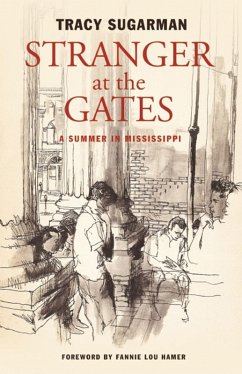During the summer of 1964, over one thousand people, including many college students went to Mississippi as part of a state wide effort to register African-American voters and to establish teaching centers that became known as "Freedom Schools."
Participants began their training at a college campus in Ohio. Motivated by a strong sense of social justice, Tracy Sugarman, an artist and commercial illustrator from Westport, Connecticut, joined the volunteers in Ohio and set out to document the people and events of what turned out to be an historic period. Sugarman joined the freedom riders, and while somewhat older and more experienced than most of them, was an active participant throughout.
Sugarman traveled to Mississippi and shared all the experiences of the workers as well as their fears and anxiety as they were greeted by anger and violence by many white Mississippians. Sugarman describes and beautifully illustrates the living conditions, day-to-day activities, and the interpersonal relationships that developed between the host families and the visitors.
The author introduces us and vividly portrays many of the important people in the movement, including Bob Moses and many others, but he also focuses on the ordinary citizens and hosts.
Other works have set forth the significant events that occurred during that summer, including especially the Goodman/Schwerner/Chaney murders that took place in Neshoba County and startled the American public. This first hand account focuses more on the human experiences and its meaning for participants. It is an essential source of information about what Freedom Summer did for those who took part in it and now, with the 50th anniversary of Freedom Summer, Stranger at the Gates will bring to life this momentous period for modern readers.
Most of the wonderful illustrations created for the 1966 edition of Stranger at the Gates have been reproduced here, and as a special bonus, 26 illustrations that were not included in the original book are included in a gallery of Freedom Summer in brilliant drawings that bring to life, in Tracy Sugarman's powerful reportorial style, the people and places of 1964 Mississippi.
Participants began their training at a college campus in Ohio. Motivated by a strong sense of social justice, Tracy Sugarman, an artist and commercial illustrator from Westport, Connecticut, joined the volunteers in Ohio and set out to document the people and events of what turned out to be an historic period. Sugarman joined the freedom riders, and while somewhat older and more experienced than most of them, was an active participant throughout.
Sugarman traveled to Mississippi and shared all the experiences of the workers as well as their fears and anxiety as they were greeted by anger and violence by many white Mississippians. Sugarman describes and beautifully illustrates the living conditions, day-to-day activities, and the interpersonal relationships that developed between the host families and the visitors.
The author introduces us and vividly portrays many of the important people in the movement, including Bob Moses and many others, but he also focuses on the ordinary citizens and hosts.
Other works have set forth the significant events that occurred during that summer, including especially the Goodman/Schwerner/Chaney murders that took place in Neshoba County and startled the American public. This first hand account focuses more on the human experiences and its meaning for participants. It is an essential source of information about what Freedom Summer did for those who took part in it and now, with the 50th anniversary of Freedom Summer, Stranger at the Gates will bring to life this momentous period for modern readers.
Most of the wonderful illustrations created for the 1966 edition of Stranger at the Gates have been reproduced here, and as a special bonus, 26 illustrations that were not included in the original book are included in a gallery of Freedom Summer in brilliant drawings that bring to life, in Tracy Sugarman's powerful reportorial style, the people and places of 1964 Mississippi.
Dieser Download kann aus rechtlichen Gründen nur mit Rechnungsadresse in A, D ausgeliefert werden.
Hinweis: Dieser Artikel kann nur an eine deutsche Lieferadresse ausgeliefert werden.









